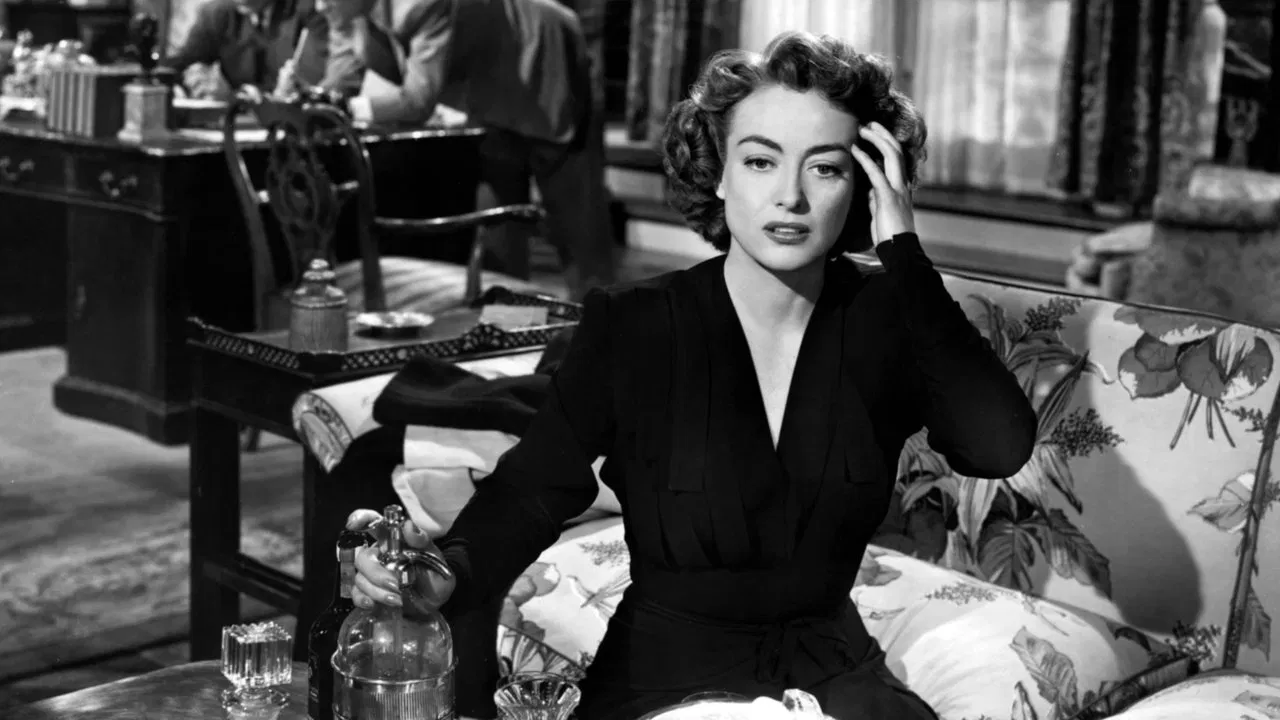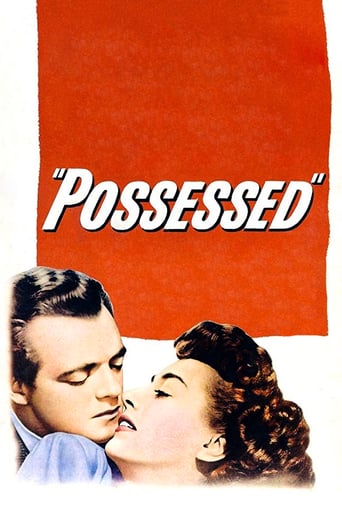

If you like to be scared, if you like to laugh, and if you like to learn a thing or two at the movies, this absolutely cannot be missed.
... View MoreThis movie feels like it was made purely to piss off people who want good shows
... View MoreThe story, direction, characters, and writing/dialogue is akin to taking a tranquilizer shot to the neck, but everything else was so well done.
... View MoreThe film's masterful storytelling did its job. The message was clear. No need to overdo.
... View MoreSeveral doctors in this film speculate that Ms. Crawford's character might be suffering from mental illness. Are they right or wrong? This is a big question to be answered in "Possessed" because it seems that somebody here could be BERSERK and might even be a candidate for a STRAIGHTJACKET! I am a little disappointed that there isn't as much plot-based drama in this film as in MILDRED PIERCE. Mildred Pierce has drama consistently built into the plot whereas this film has a lot of Crawford engaging in dramatics and neuroses rather than more active drama. However this is a more psychologically oriented film (not a noir) and Crawford's acting is believable and solid. Raymond Massey does a good job in the Walter Pidgeon role (or is it Walter Pidgeon in the Raymond Massey role?) You also get a polished jewel of a performance by Stanley Ridges. Basically a soap opera with a well-done psychology theme, "Possessed" will probably hold your attention due to Crawford's excellent performance. This film is an impressive accomplishment for her.
... View MoreThere is some very good stuff in this film but it's way too long and repetitious. It overreaches, trying to be all things to all people -- a love story, a mental-illness screed, and a noir thriller. Joan Crawford is an interesting star. She isn't beautiful or even pretty and sometimes that works in a film because she is indeed a good actress. However, in this she gets too much screen time and bogs the movie down. However, Crawford's Louise is excellent in her scenes with David Sutton (Van Hefflin). Is there any woman who hasn't swooned over a guy who doesn't give a fig? ("'I love you' is such an inadequate way to say 'I love you!'") She nails this type of heart-rending predicament. The film is also good at sketching the perils of wishing away mental illness. Not only is Louise obsessive and self-loathing but she suffers from ideas of reference and often teeters toward psychosis, yet the film would have us believe that all she needs to heal is the love of a good man. Until "Possessed" turns into a shoot-em-up, that is. Hefflin is usually a rather understated presence in a film, but he's great in this. He's believable as a cad who hangs with Louise because he doesn't have anything better to do -- spot-on as the type of heel who will just get up and leave when the spirit moves him. "In love there are no relapses," he opines to a horrified Louise. "Once you're out of it, the feeling never comes back again." (Oh, I see. So THAT'S how it works.) And Hefflin's no less convincing as a lady-killer canoodling with a love-struck ingénue (played well by the winsome Geraldine Brooks). A bravura performance! However, Raymond Massey, so compelling in some other films, is wasted here as the polite-to-a-fault widower Dean Graham, who sees himself as old -- "It isn't very easy for a man my age to kiss a woman with dignity." Yet Massey was only 51 when this was made! (I can hear his joints creaking now.) The film drags through some extended sequences with psychiatrists and Louise feeling spooked by Graham's dead wife. And I found the ending too neat. (Why do we have to tie the story up with a neat little bow?) In the introduction to "Possessed" on TCM, Josh Mankiewicz notes that its director had an affair with Crawford during filming. Maybe that explains some of the bloating here. Which is a shame because there's a lot that's pretty good!
... View MoreThe story of a thirty-something woman losing her mind in the late Forties. Her symptoms (visual and auditory hallucinations, some pushing her toward suicide) seem to indicate schizophrenia, even though that is less common in women than men, and usually manifests itself at an earlier age. Joan Crawford showed wonderful acting range, and this is the type of role designed to snag an Oscar nomination, which it did. I've not seen a lot of her work, but I am a bit surprised at her popularity back in the day. A good actress, to be sure, but, well, not that hot. Yes, I know, shallow. Anyway I also liked Van Heflin in this film (one of my mother's favorites) and Geraldine Brooks. I would have liked to have seen more of Miss Brooks, but apparently she spent most of her career on TV instead of films. Overall, this movie is OK, but not great.
... View MoreBrorrowing from the docufilm; The Celluloid Closet (1995) permits the viewer to focus on Possessed (1947) from a perspective which is the main point of the film. To explain further, The Celluloid Closet (1995) points out that the Hays Code (1930 - 1968) endeavoured to regulate morality. As such the Hays Code's purpose as a guide, leads the viewer's interpretation of the film. This has culminated in a narrow, one dimensional way of looking at film as in the case of Possessed.Accordingly, this has culminated in many consumers of this film to focus on the chief character Louise Howell (Joan Crawford). This has distracted the viewer from the bigger picture which is that of the ignorance pertaining to mental illness at that time. The ignorance is apparent when Howell's husband Dean Graham (Raymond Massey), ex-lover David Sutton (Van Heflin) and step daughter, Carol Graham (Gereldine Brooks) are oblivious to Cowell's breakdown which is in fact symptomatic of schizophrenia.Pointedly, when making his diagnoses Cowell's physician's approach to the condition is indirect. It is by skirting around the subject, Howell's physician deviates from having to use the word 'schizophrenia'. This prompts a reaction by Howell and as such she doesn't suffer fools by telling the doctor that she knows that he is diagnosing schizophrenia. She then went on to describe herself as 'crazy'. This negative stereotype of mental illnesses such as schizophrenia is not only a cause of ignorance, but moreover fuel's ignorance.Indeed the film's subtext is to convey a message to the Hay's Code and how it's prohibition on certain subject matters fuels ignorance. Such ignorance climax is tragedy as Possessed shows.An excellent marketing commodity, Crawford's VIP celebrity status permits a focus on her calibre as a star and actor. By focusing on Crawford too much the viewer overlooks the bigger picture of Possessed. Moreover the film becomes more of a tool to buttress Crawford's acting status which, as has been well documented, was vital to her vocation just prior to her Oscar win for Mildred Pierce (1945) when apparently her career as an Hollywood actor at MGM was on the slide.Warner Brothers who produced Mildred Pirce and Possessed utilised the Crawford MGM had forged, (for example see her in MGM's Grand Hotel 1932) which was the archetypal film star and turned her into a bona fide credible actor , which were acknowledged by her Oscar win and subsequent nomination for each film respectively. From here on in Crawford's film career took on a new direction.While the supporting cast in Possessed is credible their acting did not convey the depth of ignorance to mental illness as convincing as could have been. As to Crawford's acting she being a histrionic actor placed this film's genre as a hybrid of soapy nior. An example can be viewed in one scene when Howell pushes (albeit accidentally) step daughter Carol Graham down the stairs which turns out to be a hallucination, which is a prominent symptom of schizophrenia. Where the cast lack in their endeavours to highlight the ignorance pertaining to mental illness the director Curis Burnhadt makes up for this by utilising audio affects. This method serves as a tool to maximise and covey Howell's hallucinatory state. In sum this film is a recommended portrayal of the ignorance pertaining to mental illness. This is conveyed as a message to the Hay's Code enforcers that they were responsible for fuelling such ignorance. For that endeavour Kudos goes to director Curtis Burnhartd.
... View More